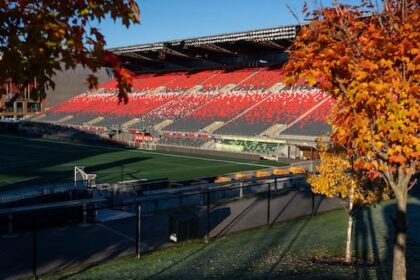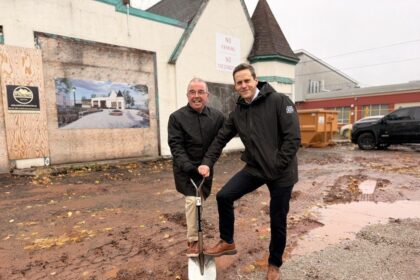ManitobaSplit by a provincial border, some residents in the Saskatchewan side of Flin Flon say they feel like they are living in a “no man’s land” fraught with challenges that their neighbours on the Manitoba side don’t even have to consider.Some Flin Flon, Sask., residents feel left behind by jurisdictional issues between their province and ManitobaLauren Scott · CBC News · Posted: Nov 06, 2025 6:00 AM EST | Last Updated: 2 hours agoListen to this articleEstimated 6 minutesDrivers travelling south on Main Street in the border city of Flin Flon, Man., will reach Saskatchewan in just a few minutes. (Travis Golby/CBC)Split by a provincial border, some residents in the Saskatchewan side of Flin Flon say they feel like they are living in a “no man’s land” fraught with challenges that their neighbours on the Manitoba side don’t even have to consider.Most of the roughly 5,000 people living in Flin Flon — about 630 kilometres northwest of Winnipeg — are Manitoba residents. They drive vehicles with Manitoba licence plates and hold Manitoba health cards. But about 200 households in the westernmost part of the city have cars with Saskatchewan plates parked out front. For these Flin Flonners, their addresses make accessing some services frustrating. Guy Rideout grew up on Saskatchewan Avenue in Flin Flon, Man., but bought a little house on the Saskatchewan side of the city decades ago. After just a few months living there, he started referring to his new home as “no man’s land.” “You do belong, but you’re not really sure what part of the world you belong to,” Rideout said. Guy Rideout, a resident of Flin Flon, Sask., says living on the other side of the border with Manitoba has made life more complicated. (Travis Golby/CBC)He carries a Saskatchewan health card and driver’s licence and has a Saskatchewan phone number. He pays provincial taxes to that province, but his municipal taxes go to Flin Flon, Man. He has a Manitoba postal code and gets his electricity from Manitoba Hydro. Rideout said residents on the Saskatchewan side are used to the “glitches” and “annoyance” of straddling the provincial border. But this summer’s wildfires turned routine frustration into a “gong show,” he said.Residents on both sides of the northern city were forced to leave home for a month, after a mandatory evacuation order was issued on May 28. Like many other Flin Flonners, Rideout evacuated to The Pas, Man., but waited for weeks to receive assistance from the Red Cross, which oversaw supports for evacuees during Manitoba’s state of emergency. He said he couldn’t get support unless he said he was from Flin Flon, Man. “It was about a week before we got home, I finally got some assistance by just being persistent,” he said. “It was very annoying.” In a statement, the Red Cross said wildfire evacuees whose primary residence was Flin Flon, Sask., were “determined eligible by the province of Manitoba to receive financial assistance distributed by the Red Cross,” and the organization “worked closely with the province of Manitoba to establish eligibility and distribute financial assistance as quickly as possible.” But Flin Flon Mayor George Fontaine, who is a dual-province mayor, said Manitoba and Saskatchewan must work better together during emergencies.”Things like fire, things like emergencies, they’re not restricted by borders,” he said.The quirks of living ‘in between’Mark Tetoff has lived in Flin Flon, Sask., for about 30 years, parking his vehicle — with a Saskatchewan licence plate — outside a home with a Manitoba postal code. The city has always felt like “one community,” he said, but there are sometimes complications.Flin Flon, Sask., resident Mark Tetoff carries a Saskatchewan driver’s licence but lives in a home with a Manitoba postal code. (Travis Golby/CBC)Back in 2018, when his wife was in Saskatoon to buy a new car, the dealership’s computer system kept producing errors because of her Saskatchewan driver’s licence and Manitoba postal code. It took two days to sort it out and complete the paperwork, he said.A similar issue happened to his son at a dealership in Winnipeg, said Tetoff.”It gets tougher the second time, and it even gets more unnerving and maddening the third and fourth time progressing,” Tetoff said. Tetoff said he’s been met with doubt and skepticism around his address — including from provincial officials while he was hunting in Saskatchewan, where he holds a firearms licence. “I’ve had it with Conservation officers, because I hunt [on the] Saskatchewan side. So you’re registered, you have a Saskatchewan licence, and then they look and they go, ‘You’re from Flin Flon, Man.,'” Tetoff said. He often feels that he lives “in between,” he said.Flin Flon Deputy Mayor Alison Dallas-Funk says city residents on the Saskatchewan side often send their kids to school on the Manitoba side, as they all pay municipal taxes to the same city. Flin Flon Deputy Mayor Alison Dallas-Funk questions why residents on the Saskatchewan side of the city no longer receive a school tax rebate from the Manitoba government. (Travis Golby/CBC)Yet Saskatchewan residents paying school taxes to the Manitoba municipality are no longer receiving a credit for it. Residents of Flin Flon, Sask., used to receive Manitoba’s education property tax credit under the former Progressive Conservative government, which provided a 50 per cent rebate on education taxes to residential property owners and an additional $350 credit for people’s primary residence. The Manitoba NDP government has now replaced that with the homeowners affordability tax credit, worth up to $1,500, and those living over the border no longer qualify. “They pay their municipal taxes to Flin Flon, and they pay their school division taxes to our school division, which is in Manitoba. So it shouldn’t matter regardless if they live on the Saskatchewan side,” Dallas-Funk said, calling the change a “misstep.”She said the municipality has written letters to the Manitoba government but has not received replies. In a statement to CBC News on Wednesday, the province said the new tax credit is “based on residency” because it is implemented under Manitoba’s Income Tax Act. “While Flin Flon residents residing in Saskatchewan pay municipal and school taxes to Flin Flon, they pay income tax to Saskatchewan, and are therefore ineligible” for the new tax credit, a provincial spokesperson said. But Tetoff said despite the challenges of living in a border city, he’s found a home in the “in between.””I wouldn’t move. This is my home,” he said. “As a community member and family here in Flin Flon, it’s always been Flin Flon. Always. There’s no division.”WATCH | Flin Flon’s Saskatchewan residents face challenges:Provincial boundary complicates life for some Flin Flon residentsSplit by a provincial border, some residents in the Saskatchewan side of Flin Flon say they feel like they are living in a “no man’s land” fraught with challenges that their neighbours on the Manitoba side don’t even have to consider.ABOUT THE AUTHORLauren Scott is a Winnipeg-based reporter with CBC Manitoba. They hold a master’s degree in computational and data journalism, and have previously worked for the Hamilton Spectator and The Canadian Press.With files from Rosanna Hempel
Friday, 6 Feb 2026
Canada – The Illusion
Search
Have an existing account?
Sign In
© 2022 Foxiz News Network. Ruby Design Company. All Rights Reserved.
You May also Like
- More News:
- history
- Standing Bear Network
- John Gonzalez
- ᐊᔭᐦᑊ ayahp — It happened
- Creation
- Beneath the Water
- Olympic gold medal
- Jim Thorpe
- type O blood
- the bringer of life
- Raven
- Wás’agi
- NoiseCat
- 'Sugarcane'
- The rivers still sing
- ᑲᓂᐸᐏᐟ ᒪᐢᑿ
- ᐅᑳᐤ okâw — We remember
- ᐊᓂᓈᐯᐃᐧᐣ aninâpêwin — Truth
- This is what it means to be human.
- Nokoma











